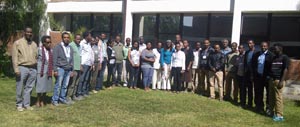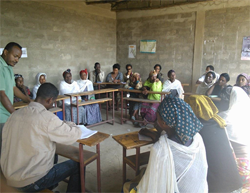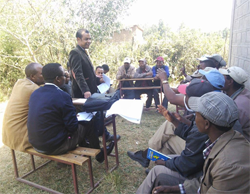N2Africa Ethiopia national team in collaboration with Project Gender Specialist and the Centre for African Family Studies (CAFS), conducted gender training workshop during 15-18 December, 2014 at ILRI Addis Campus. The trainees were drawn from agronomy, soil sciences, plant breeding and socioeconomics and research extension departments of the NARS partners. The training was conducted to sensitize partners, mainstream approaches, and design work plans to address gender inequity in legume value chains and decision-making and hence to address one of the key project objectives "Empowering Women to Increase Benefits from Legume Production".
 |
Figure 1: N2Africa-Ethiopia Gender Training Workshop participants at ILRI Campus |
With the welcoming speech by Alan Duncan (PhD), Livestock Principal Scientist and N2Africa Project Management Member, the Country Coordinator for N2Africa-Ethiopia Endalkachew Woldemeskel (PhD) made a brief overview of the different project components, including gender, and the possible interfaces between the components.
The first day of the workshop was entirely allotted to familiarizing the trainees with gender concepts in general and mainstreaming gender in legume value chains specifically. The session was led by the gender specialists, Speciose Kantengwa (IITA) and Annet Mulema (ILRI) with facilitations and contributions from N2Africa Ethiopia National team (Dr Endalkachew, Tamiru and Birhan) and CAFS (Mekdes and Abebe). The group works were engaging where the participants were able to share views and make the workshop lively.
Following the field work introduction and role play sessions during the second day of the workshop, participants were subdivided into three groups of male, female and mixed groups. Each group having a leader, who speaks local language, and a rapporteur met their respective farmers groups of manageable size at one of the project implementation Woreda, Ada’a, for the actual field work using the gender tools which were handed in advance to them during the third day of the workshop.
|
Figure 2: Practical Field Work with Chickpea Growing Female (left) and Male (right) Farmer Groups at Ada’a Woreda. Ude Kebele. |
 |
 |
Major gender challenges and opportunities, potential recommendations and action plans were developed and presented in plenary for the chickpea value chain during the fourth day of the workshop. Furthermore, together with the draft overarching gender action plan presentation by W/ro Mekdes Alemu, the trainees were able to project the field experience to their respective areas and legumes and developed draft gender action plans to be implemented during 2015 project period.
At the final closure of the training workshop, Dr Endalkachew Woldemeskel, acknowledged the trainees for their endurance and contribution at this intensive training and side planning session.
Synthesized by Tamiru Amanu (Business Development Officer, N2Africa-Ethiopia)
